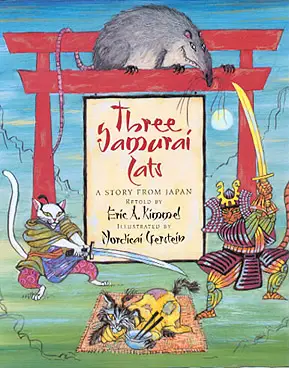 Eric A. Kimmel is an American award-winning children’s books author born in 1946 in Brooklyn, New York. He has published more than 50 books for children, many of which have won numerous state awards and appeared on school and library recommended lists. In Asia, he is known for The Sword of the Samurai, a book of adventure stories set in Japan, and Three Samurai Cats: A Story from Japan. In this interview he talks about his passions for children’s stories, Japan, the future of books, writing, and his fans. Read part 1 of the interview here.
Eric A. Kimmel is an American award-winning children’s books author born in 1946 in Brooklyn, New York. He has published more than 50 books for children, many of which have won numerous state awards and appeared on school and library recommended lists. In Asia, he is known for The Sword of the Samurai, a book of adventure stories set in Japan, and Three Samurai Cats: A Story from Japan. In this interview he talks about his passions for children’s stories, Japan, the future of books, writing, and his fans. Read part 1 of the interview here.
“The whole concept of what books are and how they are created
has been radically changed by technological developments.”
VMS: Illustrations are a very important factor in any children’s books. Who makes the illustrations for your books?
EAK: I don’t! I can’t draw to save my life. My editors find very talented artists to create the pictures that go with my stories.
It’s interesting to note that in our digital age the author and artist can live anywhere in the world. Two years ago I wrote a collection of Greek myths. I live in the United States. The illustrator lives in Spain. I sent my manuscript to the editor as an e-mail attachment. The editor sent her comments and suggestions back to me digitally. The artist created the illustrations on his computer and sent them to the editor as digital files. The only time ink touched paper was at the very end of the process when the book was finally printed.
The whole concept of what books are and how they are created has been radically changed by technological developments. I expect that within a few years everybody will have some kind of e-reader and that we will do most of our reading that way.
“What we adults think is irrelevant. The future belongs to the children.”
VMS: Everyone seems to believe that children no longer read and, with the availability of affordable e-readers, many believe that, sooner or later, children will no longer want to hold books in their hands. Please comment.
EAK: While I don’t think that books will ever go out of existence, I do believe there is some truth in thinking that e-book readers are going to play an important part in the future. I own an Amazon Kindle. Frankly, I prefer to do my reading on it. I can adjust the size of the font. Also when I’m traveling, I can pack the device with dozens of books that I might want to read. As many people have said, the e-book doesn’t replace the book; it replaces a whole library of books.
Let’s face it. Children are much more comfortable with technology than adults are. They spend a lot of time in front of digital screens now. An e-book reader is just another screen.
But why mourn the book? A book is ultimately a device to deliver content. If another device can deliver the content just as well or better, why not use it?
Some people tell me that computers and e-book readers will never replace the book. I tell them my grandma loved horses. What we adults think is irrelevant. The future belongs to the children. Whether or not books will survive in the form that we know them is going to be up to them.
 “If you’re not on the Internet, you don’t exist.”
“If you’re not on the Internet, you don’t exist.”
VMS: You have a very attractive website and even a blog. How important is it for writers these days to be “out there” on the Internet, interacting with their fans?
EAK: I think it’s critically important for any writer or artist to be online. If you’re not on the Internet, you don’t exist.
My website is a valuable tool. That’s why I put a lot of time and effort into creating and maintaining it. I believe it’s worth the investment. It’s a good way to communicate with my readers, to let them know what I’m doing, to tell them about new books that are coming out, to allow them to listen to me reading a story, and to enable them to follow my travels around the world. This is something I could never do before without the Internet. It has given my writing a whole new perspective. I feel so much closer to my fans. I think they feel closer to me and get to know me as a person and not just the picture on the back of a book cover
“We met a shamishen maker in his shop.”
VMS: You have been on quite a few school visits around the word! What were some of the highlights of these visits?
EAK: There have been so many. If I were to list them all, this interview would go on for page after page after page. Here are some highlights:
– A private tour of the castle where the Empress of Japan, Hirohito’s wife, lived as a young girl.
– A walking tour of the Hiroo district where we met a shamishen maker in his shop. He showed us how he made shamishens and played one for us. He
– Conducting a writing lesson with Chinese children in a Singapore elementary school and learning later that these children were not native English speakers. I was astounded because they spoke and wrote English as well, if not better, than American children.
– The children at the Malay school in Singapore who presented the play The Frog Prince, singing and dancing to the music of the gamelan.
Those are just a few of my memories. There are so many, many more. That’s why I want to get back to Asia.
